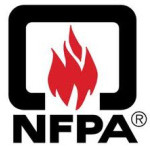- Settore: Fire safety
- Number of terms: 98780
- Number of blossaries: 0
- Company Profile:
Established in 1896, NFPA's mission is to reduce the worldwide burden of fire and other hazards on the quality of life by providing and advocating consensus codes and standards, research, training, and education.
A space for testing an aircraft engine, such as a test cell, except that the engine test space is not totally enclosed within a permanent building.
Industry:Fire safety
A space dedicated to an activity that requires the limitation or control of access by persons to certain given times, such as counting rooms, vaults, monitor stations, or areas of physical restraint.
Industry:Fire safety
A space containing the main and auxiliary propulsion machinery.
Industry:Fire safety
A space containing electronic or electrical equipment, such as that found in control rooms or electronic equipment rooms, where only Class A surface fires or Class C electrical hazards are present.
Industry:Fire safety
A space completely enclosed by walls and a ceiling. The compartment enclosure is permitted to have openings in walls to an adjoining space if the openings have a minimum lintel depth of 8 in. (203 mm) from the ceiling and the openings do not exceed 8 ft (2. 44 m) in width. A single opening of 36 in. (914 mm) or less in width without a lintel is permitted when there are no other openings to adjoining spaces.
Industry:Fire safety
A spa that is not permanent and in which the water circulating equipment can be either an integral or nonintegral part of the product.
Industry:Fire safety
A spa constructed of wood, with sides and bottoms formed separately, and the whole shaped to join together by pressure from the surrounding hoops, bands, or rods.
Industry:Fire safety
A source of electrical operating power, including the circuits and terminations connecting it to the dependent system components.
Industry:Fire safety
A solution that consists of 1. 10 percent magnesium chloride hexahydrate, 0. 16 percent calcium chloride dihydrate, 0. 40 percent anhydrous sodium sulfate, 2. 50 percent sodium chloride, and 95. 84 percent deionized or distilled water.
Industry:Fire safety
A solution of fundamental equations of fluid flow using computer techniques allowing the engineer to identify velocities, pressures, temperatures, and so forth.
Industry:Fire safety
